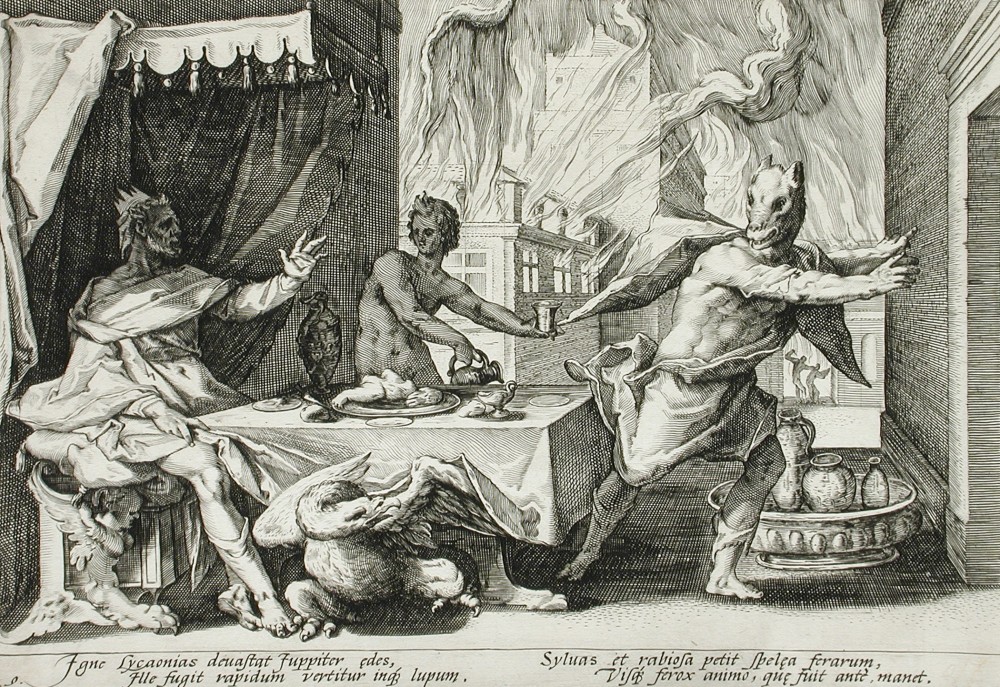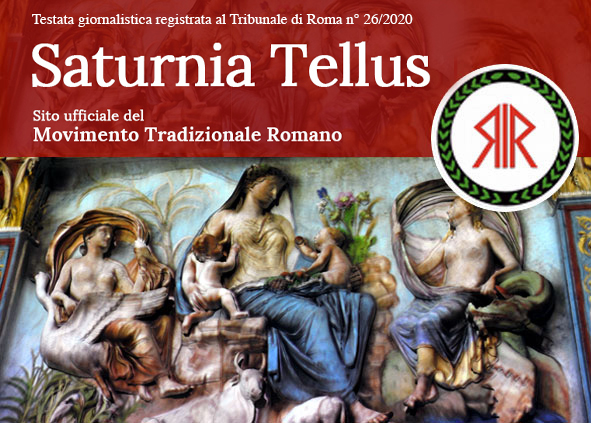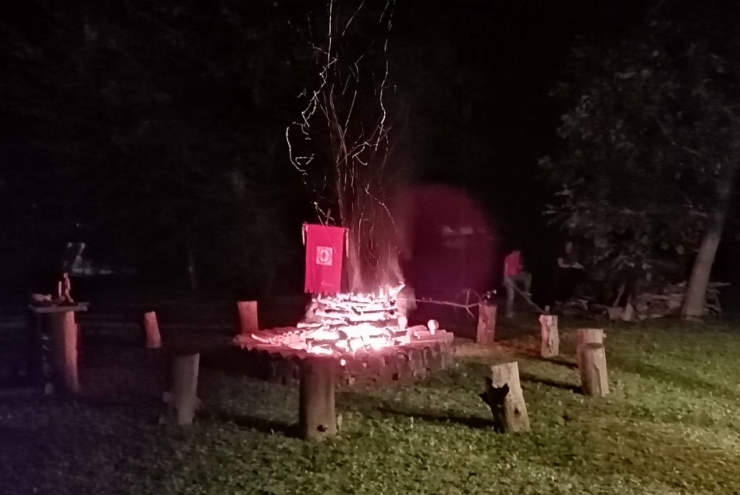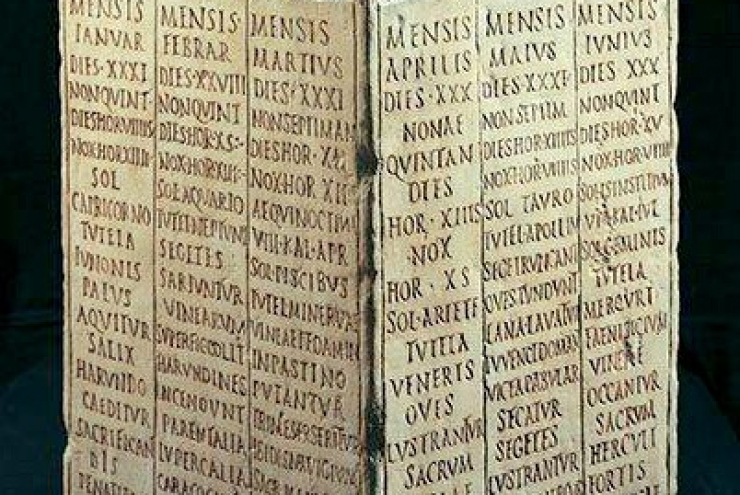Metamorphoses by Ovid. I, 151-252: Lykaon
I, 151-252

- Nēve foret terrīs sēcūrior arduus aether,
adfectasse ferunt regnum caeleste Gigantās
altaque congestōs struxisse ad sīdera montēs.
Tum pater omnipotens missō perfrēgit Olympum
- fulmine et excussit subiectae Pēlion Ossae;
obruta mole suā cum corpora dīra iacērent,
perfūsam multō natōrum sanguinem Terram
inmaduisse ferunt calidumque animasse cruōrem
et, nē nulla suae stirpis monimenta manērent,
160.in faciem vertisse hominum. Sed et illa propāgo
contemptrix superum saevaeque avidissima caedis
et violenta fuit: scirēs ē sanguine nātōs.
Quae pater ut summā vīdit Saturnius arce,
ingemit et factō nondum vulgata recenti
165.foeda Lycāoniae referens convīvia mensae
ingentēs animō et dignās Iove concipit īras
conciliumque vocat; tenuit mora nulla vocātōs.
Est via sublīmis caelō manifesta serēnō:
lactea nōmen habet candōre notābilis ipsō;
170.hāc iter est Superīs ad magnī tecta Tonantis
rēgālemque domum:dextrā laevāque deōrum
ātria nōbilium valvīs celebrāntur apertīs,
plebs habitat diversia locīs:hāc parte potentēs
caelicolae clarīque suōs posuēre penātēs;
175.hīc locus est, quem, sī verbīs audācia dētur,
haud timeam magnī dixisse Palātia caelī.
Ergo ubi marmoreō superī sēdēre recessū,
celsior ipse locō sceptrōque innixus eburnō
terrificam capitis concussit terque quaterque
- caesariem, cum quā terram, mare, sīdera mōvit;
tālibus inde modīs ora indignantia solvit:
“Nōn ego prō mundī regnō magis anxius illā
tempestāte fuī, quā centum quisque parābat
inicere anguipedum captīvō bracchia caelō.
- Nam quamquam ferum hostis erat, tamen illud ab ūnō
corpore et ex ūnā pendēbat orīgine bellum;
nunc mihi, quā tōtum Nēreus circumsonat orbem,
perdendum est mortāle genus: per flūmina iūrō
infera sub terrās Stygiō labentia lūcō,
- cuncta prius temptāta, sed inmedicābile corpus
ense recidentum est, nē pars sincēra trahātur.
Sunt mihi sēmideī, sunt, rustica nūmina, Nymphae
Faunīque, Satyrīque et monticolae Silvānī,
quōs, quoniam caelī nondum dignāmur honōre,
- quās dedimus certē terrās habitāre sināmus.
An satis, ō superī, tūtōs fore crēditis illōs,
cum mihi, quī fulmen, quī vōs habeōque regōque,
struxerit insidiās nōtus feritāte Lycāon!”
Confremuēre omnēs studiīsque ardentibus ausum
- tālia dēposcunt: sīc, cum manus impia saevit
Sanguine Caesareō Rōmānum extinguere nōmen,
attonitum tantō subitae terrōre ruīnae
hūmānum genus est tōtusque perhorruit orbis,
nec tibi grāta minus pietās, Augūste, tuōrum est,
- quam fuit illa Iovī. Quī postquam vōce manūque
murmura compressit, tenuēre silentia cunctī.
Substitit ut clāmor pressus gravitāte regēntis,
Iuppiter hōc iterum sermōne silentia rūpuit:
“Ille quidem poenās (cūram hanc dīmittite) solvit:
- quod tamen admissum, quae sit vindicta docēbō.
Contigerat nostrās infāmia temporis aurēs;
quam cupiens falsam summō dēlābor Olympō
et deus hūmānā lustrō sub imāgine terrās.
Longa mora est, quantum noxae sit ubīque repertum,
- ēnumerāre: minor fuit ipsa infāmia vērō.
Maenala transieram latebrīs horrenda ferārum
Et cum Cyllēnē gelidī pīnēta Lycaeī:
arcadis hinc sēdēs et inhospita tecta tyrannī
ingredior, traherent cum sēra crepuscula noctem.
- Signa dedī venisse deum, vulgusque precārī
coeperat: inrīdet prīmō pia vōta Lycāon,
mox ait “experiar, deus hīc, discrīmine apērtō,
an sit mortalis; nec erit dubitābile vērum.”
Nocte gravem somnō necopīnā perdere morte
- mē parat: haec illī placet experientia vērī.
Nec contentus eō est: missī dē gente Molossā
obsidis ūnīus iugulum mūcrōne resolvit
atque ita sēminecēs partim ferventibus artus
mollit aquīs, partim subiectō torruit ignī.
- Quod simul imposuit mensīs, ego vindice flammā
in dominō dignōs ēvertī tecta penātēs;
territus ipse fugit nactusque silentia rūris
exululat frustrāque loquī cōnātur; ab ipsō
colligit os rabiem solitaeque cupīdine caedis
- utitur in pecudēs et nunc quoque sanguine gaudet.
In villōs abeunt vestēs, in crūra lacertī:
fit lupus et veterīs servat vestīgia formae;
cānitiēs eadem est, eadem violentia vultūs,
īdem oculī lūcent, eadem feritātis imāgo est.
- Occidit ūna domus, sed nōn domus ūna perīre
digna fuit; quā terra patet, fera regnat Erīnys.
In facinus iurasse putēs; dent ōcius omnēs
quās meruēre patī, sic stat sententia, poenās.”
Dicta Iovis pars vōce probant stimulōsque frementī
- adiciunt, aliī partēs adsensibus inplent;
est tamen hūmānī generis iactūra dolōrī
omnibus, et, quae sit terrae mortālibus orbae
forma futūra, rogant, quis sit latūrus in ārās
tūra, ferīsne paret populandās trādere terrās.
- Tālia quaerentēs (sibi enim fore cētera cūrae)
rēs superum trepidāre vetat subolemque priōrī
dissimilem populō promittit orīgine mīrā.
Translation (*)
They say that the Giants attacked the celestial kingdom and massed the mountains one above the other towards the stars in the sky so that not even the high ether could be any longer a place safer than the earth. Then the Almighty Father threw out lightning, knocked down Mount Olympus and sent the Mount Pelion down from the Mont Ossa that carried it. It is said that when the horrendous bodies of the Giants were buried by their own mass, the Earth covered by the very blood of her sons remained wet and gave birth to a warm sea made of blood and modeled it to figures of human beings so that one would not forget her lineage. But even that generation was contemptuous of the Gods and eager for wicked and violent destruction: it was clear that that lineage was born of blood.
When the Heavenly Father, son of Saturn, saw all this from the celestial vault, he moaned and recalling the disgusting banquets of Lykaon, not yet disclosed being a recent fact, he felt in his soul an enormous rage worthy of Jupiter and called a council; no delay withheld the summoned. When the sky is clear, a sublime way appears: its name is “milky” due to its notable whiteness. Through it, the route passes for the Gods “Superi” (Gods Above) to the residence of the great Thunderous One, to the royal house: to the right and left there are the rooms inhabited by the noble Gods, while the plebs live in other places while for this part the deities powerful and illustrious established their home. This place is such that, if it is possible to accept the boldness of the expression, I do not think I exaggerate by defining it as the Palatine of the heavens. Therefore, when the Gods sat in the marble hall, Jupiter, from a higher place, leaning against the scepter of ivory, shook three times, four times, the terrifying hair of his head, by which it moves the earth, the sea, and the stars; then he uttered the following words of indignation:
“When the arms of the snake-footed giants tried to attack the sky, I was no more worried about the kingdom of the world than I am today. That time in fact, even if the enemy was fierce, the war depended only on one faction and only one cause. Now, on the other hand, I must destroy the mortal kin from all the land that Nereus surrounds with the waters: I swear on the infernal rivers, which flow underground in the Styx forest, to have already tried everything, but now the incurable limb must be cut away, so that the healthy part is not infected. I have Demigods, Gods of the countryside, Nymphs, Fauns, Satyrs and Sylvans of the mountains, to whom we must grant a safe life on assigned lands since we still do not consider them worthy of the honor of the skies. Perhaps, oh Gods Superi, do you believe that they will be safe enough, considering how Lykaon, known for his ferocity, ordered plots against me? Against me, the God that carries the lightning and that preserve and govern you! ”
Everyone murmured disdainfully ardently wishing to punish Lykaon who had dared so much. Oh Augustus, in that situation Jupiter hated mercy no less than you hated it when a band of villains tried to destroy the Roman people by spreading the blood of Caesar, leaving the human race astonished by such a terror for the sudden disaster of which the whole world was horrified. After Jupiter muted the murmur with his voice and his hand, everyone remained silent. When the noise stopped, for the powerful authority of the king, Jupiter again broke the silence with this speech:
“Don’t worry about Lykaon, because he has already paid his punishment: but I will explain to you what a crime he committed and what punishment I have given. The bad reputation of that iron age had come to my ears; wishing it was a false rumor I came down from the highest Olympus, like a god under human appearance, wandering about on earth. It would take a long time to enumerate the many crimes I found: Lykaon’s bad reputation was, in fact, nothing to compare. After crossing the Maenalus, frightening for the dens of the wild beasts and the icy pine forests of the Lyceum, I entered the headquarters and the inhospitable palaces of the tyrant of Arcadia, while the evening twilight was bringing the night. I had revealed my divine identity and the people had begun to pray, but Lykaon was the first to mock the pious prayers and then said: “I will test this God, to show openly that he is indeed a mortal; the truth will be irrefutable.” He planned to kill me at night in my sleep: this was the demonstration of the truth he chose. Nor was it enough: he cut the throat of one of the hostages sent by the Molossians, cooked a part of the limbs by throwing it still palpitating in the boiling water, and roasted a part of it on the fire. As soon as he served this meal at the table, I burned the palace with avenging fire and overthrew the Penates worthy of such a landlord; he fled in terror and reached the silent countryside. He began to howl and tried to speak in vain; today his mouth clings to his own fury, uses his usual lust for slaughter cattle, and still enjoys the blood. His clothes turn into fur, his arms into legs: he turns into a wolf and keeps the shape of his feet; the gray and the violence of the face are the same and the same eyes shine: it has the same fierce appearance. Only one house fell, but it was not the only one that deserved to end. The ferocious Erinyes dominates the whole earth. It would come to believe that men have conspired in impiety; my verdict is that they are all sentenced to the punishment they deserve as soon as possible.”
Some Gods strongly approved Jupiter’s speech, and, excited, added their own impetus. Others only assented; but all suffered from the pain of the loss of mankind and wondered what the future feature of the earth would be without mortals and who would bring incense to the altars and if Jupiter intended to deliver the land to the beasts so that they could devastate the earth. Jupiter ordered the Gods not to worry, saying that he would take care of everything and promised a new offspring of admirable origin, different from the previous one.
Comment
This long section of the first book mainly exposes two overlapping narratives. The first is the spectacular image of the divine gathering after the call of Jupiter; the second is the discourse of Jupiter, a colorful narrative in the narrative.
Jupiter, angry at the last facts, summoned the Gods, who immediately went to the heavenly palace, walking along the Milky Way. Jupiter appears as a ruler, seriously worried that the spread of evil could harm lower Gods, Demigods, Fauns, Nymphs, Satyrs, and Sylvans. The Ruler of the cosmos feels his responsibility towards the universal order and must make a quick decision to defend at least those creatures that have not broken down.
The prudent juxtaposition of Jupiter’s disdain with that of Augustus when they murdered the Divine Julius, in historical times, that is, outside the mythological narrative, as well as the comparison of the divine palace with the Palatine Hill, makes us partakers of the great divine events in our era. It is like to say that Rome and its political power has the task of defending the world from the obscure chaotic forces. We – Romans – can choose which side we are on, as the described guilt does not constitute an “original sin” shared by all humankind, but a fact linked to a cosmic impiety that in our generation can be fought by choices in the field, supporting the Rome operated. The political vision of the universe, like a kingdom to be managed, evokes the balance of the Roman Empire and probably, the dominant figure of Jupiter over the other gods, unidentified, suggests a parallel with the relationship between Augustus and the Senate. A Senate to which Augustus reports the decisions, seeking consensus, exactly as Jupiter patiently explains the situation to his own assembly. The Gods do not react all in the same way: some support Jupiter with an emotional transport, amplifying the indignation; others assent with tacit and ill-concealed concern. Perhaps the same thing used to happen in the Senate at the time of Augustus.
Let’s move on to the discourse of Jupiter. As mentioned, the catastrophe of the iron age is cosmic: there is no original sin or a single cause, but a whirlwind towards the subversion of the divine order. The universal dimension of the tragedy is revealed by the narrative juxtaposition of human impiety with the Giants’ war. The Giants are monstrous figures, with snakes for legs, and represent the dark, titanic, chaotic forces. They tried to take over the Olympus itself, but their effort was rendered vain by the thunderbolt of Jupiter, the guardian of the cosmos. The blood of the giants imbued the earth forming a sea from which the human lineage of the Iron Age was formed. If in the previous verses some of the atrocities of that wicked age had been enumerated, now Jupiter tells the story of Lykaon. Jupiter did not want to believe to the rumors, but in the end he found out that the reality was even worse. Lykaon of Arcadia, whose name is clearly derived from “lykos” that means “wolf” in Greek, is not a stupid monster like the Minotaur (bull’s head), but a coldly calculating ruler, ready to override human rights in order to prove his theses. Jupiter manifests its divinity, but even if the people begin to pray to redeem themselves, Lykaon blocks the positive process with the aim of demonstrating “scientifically” that the man who presents himself as Jupiter is actually an impostor. Already the killing of a hostage is an open violation of the right of hospitality precisely sacred to Jupiter. The attempted killing in Jupiter’s sleep is the second violation of the right to hospitality. However, the preparation of the victim’s meat which is boiled and cooked on the grill induces a natural horror and disdain: this is a recurring theme in the Greek tragedy. The punishment of Jupiter on Lykaon is exemplary: his bloody intentions, first coldly hatched, turned him into a hungry beast, condemned to concentrate his bloodlust on cattle. Thus, man has turned into an animal, losing his intellect and his ability to speak (logos).
At the time of the narration of Jupiter, Lykaon is already a problem solved, but the impious madness, personified by the Furies, spreads over the entire human race of the Iron Age, in such a way as to make Jupiter more worried than during the war of the Giants. During the war of Giants, the war was one, with a cause and a host. Instead, humans are many and divided, and evil is rampant. It is necessary to put a stop to eliminate that evil generation. Mankind will be destroyed. And yet with a total and irreversible destruction, there would disappear a function considered fundamental by the Gods, who wonder who will bring incense to the altars (rogant, quis sit latūrus in ārās tūra). The eternal theological question of what necessity would have a hypothetical divinity to create man finds expression in these lines. Even if the text does not explain it to us, we can justify this attention to humans, according to the philosophies of the time, with a search for the compactness of the cosmic order. If in the lowest areas of the cosmos there were chaotic forces hostile to the divine order, the result would be a universe in discord and continuous competition, in open contrast with the orderly and harmonic emanation described at the beginning of the first book. The humans who apply the pietas and that from the bottom of the cosmos follow the divine virtues and burn the incense to the Gods, close a perfect circle where the divine emanation also allows a return from the bottom to the top through the providence. The ascending motion of incense is spiritual and harmonious, in contrast to that descending motion of Giants’ blood, which soaks up the earth and mud. For this reason, the humankind will be saved, precisely because of that search for cosmic harmony that allows a double providential circulation in the formation from the top to the bottom and in the celebration from the bottom to the top. The Pax Deorum, as a cosmic harmony, is the function by which the new lineage of human beings will be generated.
At the end of Jove’s speech, everything is ready for the execution of the verdict, but this will be the subject of the next article.
Mario Basile
Fori Hadriani scripsit, Kal Iun. MMDCCLXXII
(*) the translation of Metamorphoses is by Mario Basile.
















